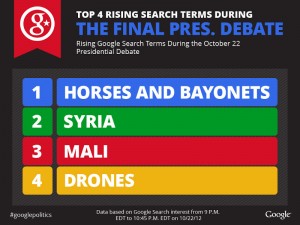Last Monday night, we witnessed the last of three presidential debates for the 2012 election. The topic was foreign policy and we thought it would be interesting to explore the data analytics of foreign policy in the aftermath of the final debate.
“Walmart Moms” Not Big on Foreign Policy
Let’s start with an interesting sentiment analysis gauged by ABC News. During the first 30 minutes of the debate, ABC’s Elizabeth Hartfield examined the sentiment for each candidate with a group of “Walmart Moms.”
The overall result?
Foreign policy did not register well with moms. One topic that did spike interest during the first half hour of the debate was Romney’s focus on his education track record. President Obama received positive sentiment when he discussed Gov. Romney’s “math not adding up” as well as when he talked about teachers.
Women in Swing States More Concerned with Foreign Policy Than Men
But ABC’s data analysis shouldn’t rule out women’s views of foreign policy and its importance in the election. In a Huffington Post article on women’s reactions to the issue of foreign policy on Twitter, we learned that “women voters in swing states were 10 percent more likely than male voters to say that defense and terrorism were ‘extremely important.'”
The Huffington Post article included a slideshow of 216 Tweets showing women’s reactions to the debate – an interesting glimpse of the poll data showing that women find defense and terrorism to be important topics.
Memes Abound Even in Serious Foreign Policy Debate
The number of Internet memes that came out of these debates was also interesting. Monday night’s meme of choice – horses and bayonets – will live on in Internet fame via Tumblr. This funny graphic from Google showed that “horses and bayonets” was the highest rising search term of the evening.
What About Close Allies and Countries Outside the Far/Middle East?
Another issue that was discussed at length relating to foreign policy was the number of countries that were left out of the final presidential debate. Tom Ricks, a Pulitzer Prize-winning journalist with ForeignPolicy.com, did an analysis of the number of individual countries mentioned in the final debate transcripts.
The outlier was the number of countries not mentioned at all. And as Ricks pointed out in his recap of the analysis and debate, “completely left out of the discussion are the United States’ closest neighbors, as well as Palestine, the diplomatic gravity of which is inescapable by the second-most talked about country in the debate.”
Ricks, as well as other journalists, noted that Mexico was completely absent from the debate. Ricks said, “When one considers the political instability, rising violence and influence of the cartels, the infiltration of drug gangs into the United States, and the increasing sophistication of their networks, it is arguable that narco-terrorism to the south is a greater existential threat to national security than fundamentalist terrorism based overseas.”
The Bottom Line
Foreign policy matters to this election. Although just 4% of voters considered foreign policy their main deciding factor, foreign policy has always played – and will continue to play – a huge role in economics, national security and the national debt. And there are plenty of data analytics to back that up.
Next Steps:
- Subscribe to our blog to stay up to date on the latest insights and trends in data analysis and data analytics.
Amanda Brandon
Spotfire Blogging Team






